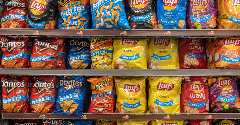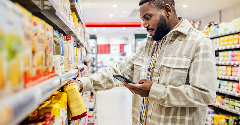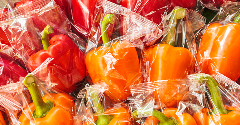News
New Umami salt can help manufacturers improve their Nutri-Score
10 Aug 2020Sea salt producer Salt of the Earth has developed an umami ingredient solution to help manufacturers reduce the sodium content in their products while also improving their Nutri-Score. The company says its product can lower sodium scores by three to five points and can reduce sodium by up to 45% in a variety of products.
The Israeli company’s solution is called Mediterranean Umami and comes in a powder and a liquid form. It can be used as a one for one replacement for salt in snack applications and is made from natural plant extract derivatives that are rich in umami compounds. "Mediterranean Umami allows food manufacturers to significantly reduce the amount of sodium in their product, without compromising on flavor,” said David Hart, Business Unit Director for Salt of the Earth in a release.

Europe’s Nutri-Score system is a front of package labeling system that was developed in France in 2017 and has since gained popularity from consumers as well as endorsements from both governments and large corporations. So far, Nutri-Score has been officially recommended by health authorities in France, Germany, Belgium, Netherlands, Luxembourg, and Spain, as well as by the European Commission and the World Health Organization. Similarly, Nestlé and Danone are actively working toward adopting the system on all their packaging across the European market.
Using a color-coded system, consumers are able to judge the health of a food product by scanning a color gradient bar that indicates a score ranging from A (healthier choices) to E (less healthy choices). Points are awarded to products based on the total number of “negative" characteristics of the food (calories, sugar, saturated fat, and sodium) and "positive" characteristics of the food (fruit and vegetable content, fiber, and protein levels). Studies have indicated that this front-of-pack labeling scheme has been successful in helping consumers select healthier choices at a glance.
The buy-in from consumers and governments has created a new playing field for ingredient producers like Salt of the Earth to provide alternatives for manufacturers looking to improve their scores. "We have seen increased interest from customers seeking to improve the Nutri-Score of their products," Hart said.
However, this recent push toward adopting the Nutri-Score system and its promotion of clean-label products is not unanimously accepted throughout Europe. The German Sugar Industry Association has spoken out against the method saying that the algorithm used to evaluate a product’s score could mislead consumers. Italy too has resisted this labeling methodology saying it singles out traditional Italian products such as Parmigiano Reggiano and extra virgin olive oil as unhealthy due to their fat and calorie content.
Related news

PepsiCo formulates ‘naked’ Cheetos and Doritos products
31 Dec 2025
US food giant PepsiCo has launched its Simply NKD range, a move it says reimagines its popular products with new formulations free from artificial flavours, dyes, and colours.
Read more
Debate over ban on ‘meaty’ names for plant-based products reaches stalemate
26 Dec 2025
The debate over a ban on plant-based products using “meaty” terms has reached a stalemate, leaving manufacturers in limbo and still facing overhauls to their marketing and packaging.
Read more
Ingredient transparency key to success in European natural health market
12 Dec 2025
Europe’s $40.7 billion supplements market is growing fast, fuelled by demand for products that support healthy ageing, mental wellbeing, and preventive health, say experts.
Read more
Whole Foods Market forecasts fibre frenzy for 2026
11 Dec 2025
Whole Foods Market has released its top 2026 trends, predicting that a fibre frenzy will take place next year as health-conscious consumers seek out nutritious, filling options.
Read more
Which sustainability-related labels are consumers willing to pay a premium for?
10 Dec 2025
Products with animal welfare and geographic origin labels elicit a higher willingness to pay a premium than those with carbon-related labels, research suggests.
Read more
Sorghum emerges as better-for-you hero ingredient
9 Dec 2025
With the launch of Novak Djokovic’s sorghum-based brand, the grain’s popularity in the better-for-you snacking sphere is on the rise, thanks to its nutritional and sensory properties.
Read more
Turning global trade challenges into opportunities
4 Dec 2025
While our food innovation ecosystem is in a healthy place, certain barriers persist. A panel of experts at Fi Europe shared their ideas and strategies for overcoming these, to fully unleash Europe’s potential.
Read more
Yuka’s food scanning app helps consumers make healthier choices
2 Dec 2025
Global food scanning app Yuka helps consumers understand the content of their shopping baskets and shapes producers’ reformulation plans.
Read more
Plastic packaging toxicity a ‘ticking timebomb’ for FMCG companies
1 Dec 2025
Studies on the toxicity of plastic have spiked in the past decade – and the evidence points to a “ticking timebomb” for manufacturers and consumers alike, an analysis suggests.
Read more
Non-UPF Program extends certification scheme to entire food industry
30 Nov 2025
The Non-UPF Program has extended its certification scheme to the wider food sector, championing a move towards healthier consumption habits.
Read more